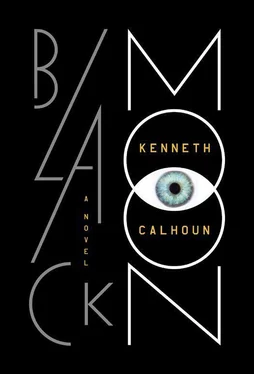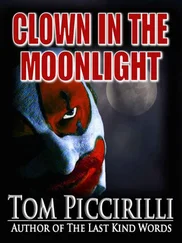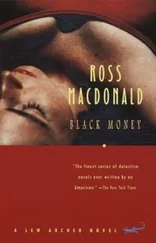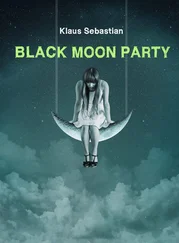Swimming through swirling currents of trash, she followed the sound as it drew her farther away, deeper into the maze of streets—the suburban labyrinth. She was lured by the wind into one cul-de-sac after another, one development, two, three, away from Felicia and her dreamless sleep, gathering chimes in a kind of midnight harvest.
The wind eventually stripped the mask from her head and rolled it down the street. She chased after it, the chimes she had gathered ringing out like an alarm.
BY DAWN, when the wind finally died down, she was wandering with her mask in her hands. She had made the decision to fill it with the wind chimes, after the wind made it impossible to keep it on her head with the chimes in her hands. It now served as a soft bucket filled with muted noise, grinding like shards of glass when she hugged it close as she walked on, looking for Felicia. The sun rose over the mountains. Her long shadow stretched out beside her, sliding over the cluttered yards. It was the second time in her entire life she had stayed awake through the night—the first being the night of the car crash, which seemed like a lifetime ago.
How had insomnia worked its way in? In her distressed state, she could only think that it had something to do with Felicia’s appearance. More specifically, she kept feeling the faint phantom buzz of the pulse generator against her palm. She never should have touched it, she concluded—her mind already fogging over from lack of sleep, thoughts sticking together in unreasoned clusters. The toxic elements of the epidemic traveled in a vehicle of vibration into her system. And like the sleep directive the pulse carried through the wire in Felicia’s neck, the signal had traveled deep into her brain. Only the message had gotten garbled, scrambled, and it was received as on instead of off .
And now what I’ve seen happen to everyone will happen to me, she recognized with a shudder. To have dodged it this long was an impossibility—succumbing was inevitable. Yet a part of her had believed she was truly immune. Somehow special. Endowed with a resistance that was possibly the product of her parents. Their blend of genes, their blood. But no.
Oh my god.
She needed to find Felicia, to return to the center with her. She needed one of those implants. It caused all this, but it could fix it too.
The streets were a scrambled mess, a picture of epic disarray. She ran through the cul-de-sacs, the chimes in the mask emitting a metallic crunch with each step. All the houses looked the same. She entered a few, convinced she was in the right place. She began to cry as her fears mounted. With her hands occupied by the mask, she had to wipe her eyes by pressing her face into her shoulder. She tried desperately to remember where Felicia’s parents’ house might be, but Felicia had said nothing about its location.
Her only option was to walk the streets of the developments, stepping over the fallen tree branches and shattered roof tiles, kicking aside the duff of documents and records expelled from home offices and sifted by the Santa Ana. The sun bore down. She walked past the occasional insomniac down on hands and knees combing through the littered yards—that ceaseless searching. Why fear them now? she thought. Why hide? I’m one of them. Mask or no mask, she was largely ignored as she passed through the abandoned neighborhoods. There was only a germ of relief in this.
In the early afternoon, she found herself at the edge of the neighborhood looking out over an undeveloped expanse. Even the tawny chaparral was now speckled and dotted with windblown trash as far as she could see. The scene was divided by a chain-link fence that ran from the foothills down through the entire valley. She made her way to it. The fence ran along the cracked concrete banks of an aqueduct. Peering through, she saw the dark, mossy water slowly passing through the channel. With a flash she remembered the man who had drowned trying to get at her as she floated on the tethered raft. Could this be the same aqueduct that ran past their house in the desert? Her father had said that it ran all the way to the ocean, carrying water from the Sierras to the reservoirs of the L.A. suburbs and inland valleys of farmed land, then onward to the sea.
If she followed it, would she find herself on the beach? And from there, could she find the university where the sleep center was located?
She walked along the fence until she found a gate. It was locked but the gap between the posts was wide enough for her to squeeze through. Only the mask, with its noisy cargo, could not fit. She decided to heave it over the fence, stooping over and swinging it between her legs, then catapulting it upward like a beaked basketball. It cleared the top of the fence, chimes spilling noisily out of it, then came down hard on the steeply sloped concrete bank with an explosion of sound, a chandelier crashing from the sky. The mask rolled to a stop at the bottom of the basin, where there was a bank of flat cement that dropped away abruptly to the wide channel at the bottom. There the water flowed slowly along.
She squeezed through the gap and edged her way down the slope, collecting the loose chimes as she went. They jangled as she scooped them up. The mask was in poor shape. The impact had blown out one of the eyes and a seam in the back had split. She picked it up and held it together so the chimes wouldn’t spill out.
Down in the channel, she could see up the endless corridor of concrete to the north, where the mountains loomed—crisp and detailed in the wind-cleared air. To the south, the dark water ran away from her, narrowed by distance into a thin black line slicing through the valley.
Yes, it probably ran all the way to the sea. She could walk along the edge, following it down, all the way to San Diego. Scanning the ridges for the campus Felicia described. They would see her. They would hear her, jangling noisy things with her feet in the cool water. Felicia would be astonished to see her.
But another thought struck her: it could also lead her home, to her parents. It was maybe the first opportunity she had had since the crash that stranded her here to find her way back.
It made no sense to go there. They were gone, she was sure. But something tugged at her—a strong current of emotion pulled her toward home. She could show them that she was the same. That she was just like them now.
Upcurrent, about thirty yards away, she saw the dark maw of a drainage tunnel opening into the steep cement bank that blazed whitely in the sunlight. She angled up the bank, carrying the mask in her arms, and eased into the cool, dark space. It wasn’t the first time she had sought refuge in a drainage tunnel. She peered into the impossibly dark hollow as she sat down, her back bending to the curved wall. What she needed was some time to stop and think.
If this was it, if she was now sleepless, the notion of going home pulled at her. That’s where she would be reunited. She would wait out the heat, then start the journey.
She propped the mask behind her and lay back, resting her head on its lumpy form. The chimes clinked dully under the weight of her head. She imagined walking up to her house and hearing her mother playing the piano inside. She could hear every note of the music so clearly.
Minutes later, the music echoed on into her dreams. She had once again found her way to sleep.
17

HE TOLD THEM, “SHE ONCE SAID THAT NO one ever looks up. I remembered that she had shinnied up the skylight pole and onto the roof. I went back to the loft to see if she was there. When I opened the door, I found her sitting at the table, fully restored, with Maria, the lullaby singer, sitting across from her. They were eating baked pigeons and a salad of nests. My wife smiled and nodded toward an empty chair. Sit down, she said. There is enough. I sat and they put food in front of me. I held a bird’s body in the palm of my hand and it pulsed like a heart.”
Читать дальше













